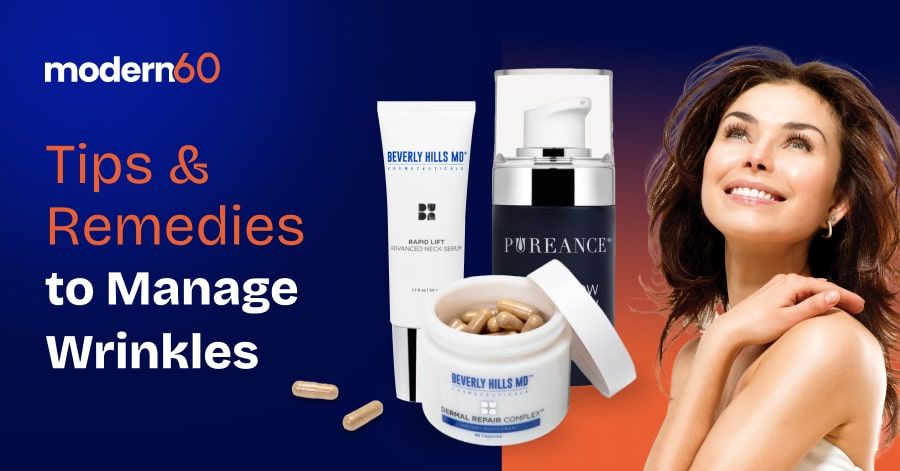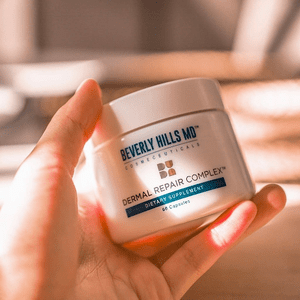How To Fix Aging Skin?
The Look Younger Shortcut You Can Do At The House
How to Prevent Wrinkles: 4 Proven Tips for Smooth Skin

Last Updated on,
April 24th, 2025

The telltale signs of aging are wrinkles, and though they may be an unwanted part of the process, they are unavoidable. These creases that appear on your skin can be a result of a myriad of reasons and can come with some unusual effects like increased skin sensitivity and flakiness. This is not to say that it cannot be successfully managed! Lifestyle changes, nutrition, hydration, and the right products can help lessen the visibility of wrinkles and improve the suppleness of skin.
What Causes Wrinkles?
The fine lines and creases that appear on the skin primarily occur when it dries out and loses its protective layer due to age. Along with this, various external factors can also contribute to the development of wrinkles.
Age
With advancing age, the skin begins to lose its elastic fibers, also slowing down the production of collagen, the structural component responsible for its flexibility. This causes the skin to lose its strength and elasticity, resulting in a wrinkled appearance.
Sun Exposure
When you spend too much time in the sun, the exposure to ultraviolet rays silently ages the skin and contributes to premature wrinkles. These rays can deform collagen fibers, leading to the formation of wrinkles.
Repetitive Expressions
When the facial muscles tighten and relax frequently due to repetitive smiling, squinting, or frowning, it accelerates the progression of wrinkles. This also leads to the formation of frown lines between the eyebrows and crow’s feet, which develop at the corners of the eyes.
How to Prevent Wrinkles?
Wrinkles develop slowly and over time. When you search online for “how not to get wrinkles” or “can you get rid of wrinkles,” you will find various resources that provide useful information on tips and strategies to manage fine lines effectively. There are multiple ways to slow down the visibility of wrinkles.
Try Supplements
When it comes to managing wrinkles, supplements can be a smart addition to your skincare regimen. Experts recommend supplements because they often contain collagen and peptides—short strings of amino acids that make up essential proteins in the body. For those looking to improve their skincare routine, one product worth considering after consulting with an expert is the Beverly Hills MD Dermal Repair Complex. In addition to hydrolyzed collagen, this product also contains other key elements such as saw palmetto, MSM, hyaluronic acid, and vitamins A and B. This unique combination of ingredients helps promote firmer, lifted, and smoother skin while also reducing the intensity of wrinkles.
Always Stay Hydrated
Dry skin speeds up the formation of wrinkles. To prevent this from happening, drink enough water throughout the day as it helps keep your skin nourished. Keeping the skin hydrated softens the impact of forehead wrinkles. Aiming for eight glasses of water a day can do wonders for your skin. But if you walk, run, or exercise daily, then it is advisable to drink more than this amount. For those who find plain water boring, try adding lemon juice for a refreshing flavor.
Use Sunscreen
Topical products like sunscreens aren’t just for sunny days—they are an effective shield against wrinkles as well. Since exposure to UV rays can accelerate the formation of lines, the best remedy to counter this is to use sunscreen with SPF 30 each morning before stepping out of the house. This contains properties that can delay skin aging and lower the risk of dark spots and wrinkles. Apply sunscreen, even on cloudy days and in winter, as sunlight can still penetrate in dull weather and affect your skin.
Apply Anti-Wrinkle Creams
While they aren’t a permanent solution for fine lines, anti-wrinkle creams can help address your common concerns, such as wrinkles around the eyes. The composition of anti-wrinkle creams can temporarily trap water in the skin, which helps mask fine lines and creases. This can also lead to better skin texture and an even tone. Some common ingredients in anti-wrinkle creams include retinol, vitamin C, niacinamide, and azelaic acid. When combined, these ingredients can help manage wrinkles. It is important to note that the effectiveness of these products depends on your skin type and the active ingredient in the cream. There are also products available in stronger compositions, which are best prescribed by a doctor.
Can You Get Rid of Wrinkles Completely?
The brilliant Mark Twain once said, “Wrinkles should merely indicate where smiles have been.” This is a reminder that they are just a natural part of aging and life’s experiences and also something that can’t be completely eliminated. Still, to maintain the vibrant and smooth look of your skin, you can find a skincare routine that works best for you and combine that with products that suit your skin and budget. Again, remember to consult your doctor about the most effective steps to manage wrinkles and avoid complications.
Read More: Best Anti-Aging Skin Care Routine
10 Products to Prevent Wrinkles
- Beverly Hills MD Dermal Repair Complex
- Beverly Hills MD Rapid Lift Advanced Neck Serum
- Pureance Lift & Glow
- Banana Boat Light As Air Lotion SPF 50
- Dr. Dennis Gross Skincare Retinol + Ferulic Wrinkle Cream
- The Outset Smoothing Vitamin C Eye + Expression Lines Cream
- Peter Thomas Roth Peptide Skinjection Moisture Infusion Refillable Cream
- Caudalie Resveratrol Firming Moisturizer
- Elemis Pro-Collagen Marine Cream
- Play Everyday Lotion SPF 50 from Supergoop
Effective wrinkle prevention or reduction is possible through a holistic approach that involves home remedies and therapy. But you can also achieve better, healthier-looking skin by using expert-recommended skincare products, such as those mentioned above. While all these strategies can be effective against wrinkles, it is important to select the right option that suits your unique situation after consulting with a certified healthcare professional.
FAQs
Does Moisturizing Prevent Wrinkles?
Moisturizing the skin can make it appear plumper because of the hydration it provides. But it is important to note that the effects can be temporary, and you will need to use the product regularly, along with other skincare remedies, to fully enjoy its benefits.
Can You Reverse Wrinkles?
The aging process is natural, and wrinkles cannot be completely erased or reversed. But, with the guidance of a doctor, you can try different methods to prevent skin damage and delay the appearance of fine lines.
What is The Best Way to Prevent Wrinkles?
The best way to stay ahead of wrinkles is by adopting a mix of expert-vetted management methods that support your skin type and delay visible signs of aging. While sunscreens, anti-wrinkle creams, and supplements are some helpful options, lifestyle changes, such as eating healthy foods and getting enough sleep, can also contribute to better skin quality.
Does Drinking Water Help Reduce Wrinkles?
Yes. Drinking water can temporarily reduce the visibility of wrinkles. Properly hydrated skin will show fewer signs of fine lines in comparison to dry skin.

- Zuri Hawkins-Jarrett graduated with her doctorate in pharmacy from The University of Georgia College of Pharmacy. She completed her residency training with Piedmont Columbus Regional in ambulatory care.
- Zuri also has a Master of Public Health degree from Emory University with a focus on Prevention Science. She has a passion for pharmacy and public health to help those in her community diagnosed with chronic conditions.



There are no comments yet